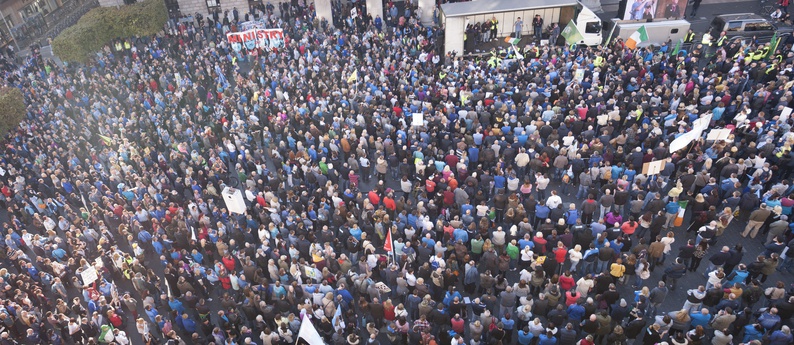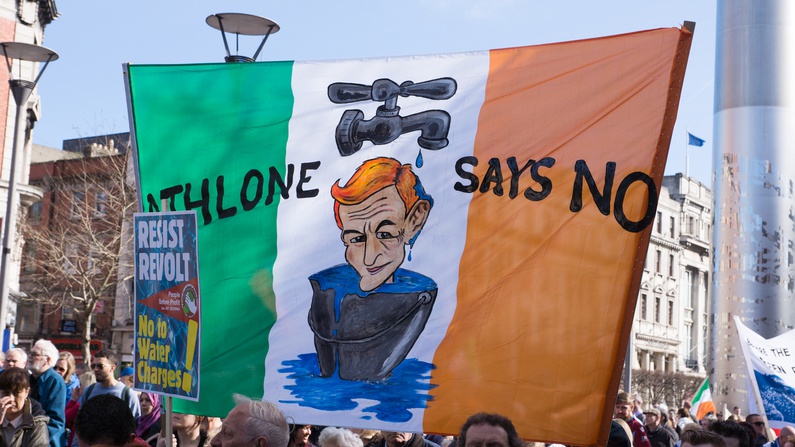
Irish people against Irish Water: the fight against more charges
Published on
Housing crises, bank guarantees, hidden borrowing: southern Europe was hit hard by the raging economic storm of 2008. From this critical juncture, member states took very different approaches to rectify their financial woes.
In Ireland, the fight against austerity has centred on the privatisation of water.
Whereas the rest of peripheral Europe were stamping their feet and dragging their heels against the troika, Ireland danced the merry dance of austerity and came back for an encore. However, Ireland’s role as the poster boy for austerity earned it the enmity of other hard-pressed nations. "This is Greece, not Ireland. We will resist" was a familiar slogan on the streets of Athens back in 2011 as Greece underwent the largest debt restructuring programme in recent memory.
Fast-forward three years and Ireland paints a very different picture. Tens of thousands march through Dublin to voice their displeasure at the establishment of the notorious private utility company, Irish Water. It's now well into 2015 and the protests are still going strong, with conservative estimates suggesting between 30-40,000 people took to the streets last month. Another major demonstration is pencilled in for mid-April.
 Such sustained opposition to water charges may seem quite remarkable, given Ireland’s timid response to the swathe of cuts and extra charges that have gone before it. It may even seem unwarranted, seeing as the vast majority of EU member states already pay water charges, and at a much higher rate. In fact, many protestors agree that water is a resource and should be paid for. There are, however, a number of differences between the rationale of the Irish government and that of the people on the streets, something that has contributed to the perpetuity of the water debate.
Such sustained opposition to water charges may seem quite remarkable, given Ireland’s timid response to the swathe of cuts and extra charges that have gone before it. It may even seem unwarranted, seeing as the vast majority of EU member states already pay water charges, and at a much higher rate. In fact, many protestors agree that water is a resource and should be paid for. There are, however, a number of differences between the rationale of the Irish government and that of the people on the streets, something that has contributed to the perpetuity of the water debate.
Double taxation?
For one, many protestors argue that water is already paid for through standard taxes, just like schools, hospitals, and parks. It therefore seems deceptive, even pernicious, of the government to introduce such an exclusive taxation. Irish Water's rebuttal to this argument is that water should now be treated as a resource, like oil and gas, and requires more funding and investment to ensure a high level of water efficiency. The issue of efficiency boils down to the reality that Ireland loses nearly 50 million litres of water through pipe leaks every day.
This fact has provided fuel for both sides of the argument. Those who are pro-Irish Water argue that exclusive water charges are necessary to pay for the fixing and replacement of pipes. In the other camp, protestors retort that the company isn't spending enough on such fixes, instead spending it on publicity campaigns and consultants. With leaks still such a prevalent issue, this conflict has shown few signs of resolution. Yet, leaks aren't the half of it. Water is actually unsafe to drink in parts of the country - with lead (which the old pipes are made of), other dangerous chemicals and bugs found in routine quality tests.
 Another, perhaps deeper issue is not the logistics of Irish Water, but rather the principle. Since the start of the Euro crisis, Ireland has diligently played the austerity game, and made numerous sacrifices in the process. Since 2008, the Irish people have seen public wage cuts of 15%, the cutting of 30,000 public sector jobs, and a steep increase of youth emigration. Without this migration, Ireland’s youth unemployment would be comparable to Southern Europe.
Another, perhaps deeper issue is not the logistics of Irish Water, but rather the principle. Since the start of the Euro crisis, Ireland has diligently played the austerity game, and made numerous sacrifices in the process. Since 2008, the Irish people have seen public wage cuts of 15%, the cutting of 30,000 public sector jobs, and a steep increase of youth emigration. Without this migration, Ireland’s youth unemployment would be comparable to Southern Europe.
This burden is made startlingly explicit when you look at how much bank debt was shouldered by the Irish taxpayer. While accounting for a little over 1% of the EU population, Ireland paid 42% of the total cost of the European banking crisis, just beating Germany as the biggest contributor. Note that this is the European, not Irish, banking crisis that we're talking about.
Irish Water really is just the tip of the iceberg in terms of the financial hardship already endured by the Irish citizenry, but its tangibility as a public policy has made it symbolic of the breaking point of any Irish complacency in dealing with austerity. After all, the installation of water-meters is a lot easier to obstruct and blockade than pay cuts and unemployment.
This month, Irish Water will be asking taxpayers for their first water payments. Over one million households have now registered for Irish Water, about two thirds of those eligible to do so.
This is a marked improvement from last year, but questions still remains as to how the government will deal with those that are still resisting and how anti-austerity protesters will react.
Watch this space.



